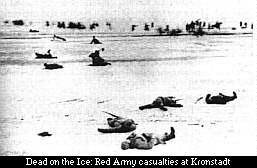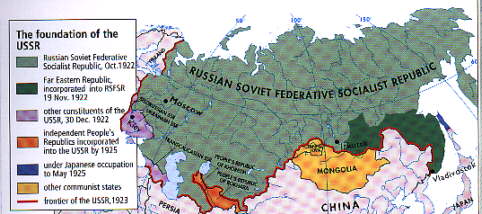Naked Power: The First Show Trials, The Conquest of the Caucasus, and Kronstadt
With the Civil War over and the peasant rebellions crushed, Communist rule was uncontested. What now? In spite of all the horrors of their regime, Lenin and his followers still had a chance to turn back from the abyss. As Carl Landauer speculates:
If everybody had been assured of protection from arbitrary arrest or exile, if everybody had been granted a sphere of economic activity in which to make some sort of living and have some reasonable degree of security, non-Communists, who had gone through the terrors of the civil war, ostracism, and famine, would have been content, at least for a considerable time, with a modest amount of political rights... If the Bolsheviks had taken the attitude that revolutionary terror had been necessary only as long as the revolution was endangered, and that with the end of the civil war and of the gravest economic difficulties the regime could afford to lay aside the sword and use only the normal means of judicial procedure to protect itself from subversive activities, they would have restored the connection of their own movement with the humanitarian tradition of socialism. (Carl Landauer, European Socialism: A History of Ideas and Movements)
In short, with a supreme act of will, Lenin could have used his last years to disarm the malevolent machine of totalitarianism he had invented. This was not the course he chose. Instead, he spent his last years fine-tuning his creation and finishing off remaining enemies.
While struggling to retain power, Lenin took whatever help he could get. Now it was time to finish off these myopic dupes who deemed Communism the least of political evils. "As long as the Civil War was in progress, the SRs and Mensheviks had been tolerated because they helped Moscow against the Whites. Their persecution began the instant the Civil War was over. Surveillance followed by arrests started in 1920 and intensified in 1921." (Richard Pipes, Russia Under the Bolshevik Regime) Aside from traditional forms of persecution such as prison, Lenin satisfied his quest for revenge by inventing the "show trial" - a new form of theater which Stalin would later develop into the high culture of the USSR. In June of 1922, 34 SR leaders were publicly tried for high crimes against the Soviet state. The judges were all Communists, and while apparently the accused were not tortured, there were other ways of pressuring them to confess to the trumped-up charges. While the SRs - due to an international campaign in their defense - were allowed foreign lawyers, these lawyers walked out when the prosecution reneged on its promise not to seek the death penalty. All were naturally found guilty, although in the end international pressure led to the commutation of the death penalty. (Although later all but 2 of the defendants would later be executed by Stalin). Similar show trials of dissident Orthodox priests went on at the same time. All ideological rivals, secular or religious, had to be broken.
The same applied principles were applied to foreign policy. In the Caucasus, independent states of Azerbaijan, Armenia, and Georgia had been formed during the Civil War. Now it was time for Lenin to show how much he truly cared about national self-determination. Azerbaijan fell first: a coup backed up by the Red Army sovietized Azerbaijan in April of 1920. Next came Armenia. Here, Lenin made a deal with the Turks, who had barely completed the extermination of Turkey's ethnic Armenians. (The Armenian genocide, said Hitler, gave him much inspiration). Turks invaded Armenia from the south, the Red Army from the north; by December the bulk of Armenia was under Communist rule.
Georgia fell last, and captured the most international attention. The Mensheviks had been democratically elected in Georgia, and international visitors had a quite favorable impression of their humanity and sanity. But Lenin was sick of heeding world opinion; he preferred dealing with Mustapha Kemal, the dictator of Turkey. Turkey issued Georgia an ultimatum while the Red Army invaded. Georgia fell in February of 1921; a year later, Armenia, Azerbaijan, and Georgia were united as the Transcaucasian Socialist Federal Soviet Republic.
This was one case where the Western socialist movement took a stand against Communist aggression. Karl Kautsky, veteran socialist of Germany, had the courage to note that for all his diatribes against imperialism, Lenin was an imperialist himself: "[W]e would render our protest against the imperialism of the capitalist powers ineffectual if we did not dare to oppose imperialism where it has resulted from a proletarian revolution, which it discredits." Unfortunately, the opprobrium from this act did not stick. Most of the world continued to view Britain and France as the only imperialist powers of note; indeed, Western countries would be called "imperialists" decades after the fall of their empires while the Soviet Empire remained "Russia, One and Indivisible."
 The rebellion at Kronstadt was a final, bloody demonstration that
despotism would be a permanent feature of the Leninist state. The sailors
at the Kronstadt island fortress had long had a reputation for socialist
(and anarchist) extremism. But in early 1921, they braved their lives by
voting for the virtual destruction of Lenin's state. Their resolution
demanded new elections by secret ballot, freedom of speech and press
(except for non-socialists), free trade unions, and the right of the
peasants to use their land as they pleased. Lenin had a mutiny on his
hands. Meeting the demands was out of the question; instead he called in
Trotsky, the Red Army, and the Cheka.
The rebellion at Kronstadt was a final, bloody demonstration that
despotism would be a permanent feature of the Leninist state. The sailors
at the Kronstadt island fortress had long had a reputation for socialist
(and anarchist) extremism. But in early 1921, they braved their lives by
voting for the virtual destruction of Lenin's state. Their resolution
demanded new elections by secret ballot, freedom of speech and press
(except for non-socialists), free trade unions, and the right of the
peasants to use their land as they pleased. Lenin had a mutiny on his
hands. Meeting the demands was out of the question; instead he called in
Trotsky, the Red Army, and the Cheka.
It was Trotsky who led the assault on Kronstadt, with the ideological fig leaf that the Kronstadt mutineers were "White Guards." Trotsky ordered the wives and children of the sailors taken hostage. But the mutineers held firm, begging like-minded forces to follow their example and rise against Lenin's dictatorship. A manifesto of the Kronstadt rebellion trenchantly attacked Communist rule:
In carrying out the October Revolution, the working class hoped to achieve its liberation. The outcome has been even greater enslavement of human beings.Power has passed from a monarchy based on the police and gendarmerie into the hands of usurpers - Communists - who have given the toilers not freedom but the daily dread of ending up in the torture chambers of the Cheka, the horrors of which exceed many times the rule of tsarism's gendarmerie.
The rest of the nation was too terrorized to respond. The waters around Kronstadt were frozen, so the Red Army was ordered to march across the ice. The Cheka stayed in the rear, machine guns ready, with orders to kill all retreating soldiers. The battle was tragic, for plainly the attacking troops sensed that the Kronstadt rebels were not their enemies but their friends. As Pipes relays, "Some Red soldiers refused to charged; about one thousand went over to the rebels." (Russia Under the Bolshevik Regime) But the outnumbered Kronstadt defenders could not hold out. The fortress fell on March 18. Rebels who survived the battle and the executions that followed were sentenced to concentration camps. Few would live to tell the tale. Trotsky, who did live to tell the tale, chose not to tell it; he chose to leave Kronstadt out of his memoirs.
Kronstadt did frighten Lenin enough to relax his draconian economic policies. Grain requisitioning was replaced with a flat grain tax to give incentives to produce. But the New Economic Policy (or NEP) came too late to avert the 1921 famine. By getting rid of War Communism, Lenin stabilized his regime. Less than a decade later, the Soviet state under Stalin's rule would be too powerful for even the most monstrous economic policies to topple.

|
| ||

| ||
|
|